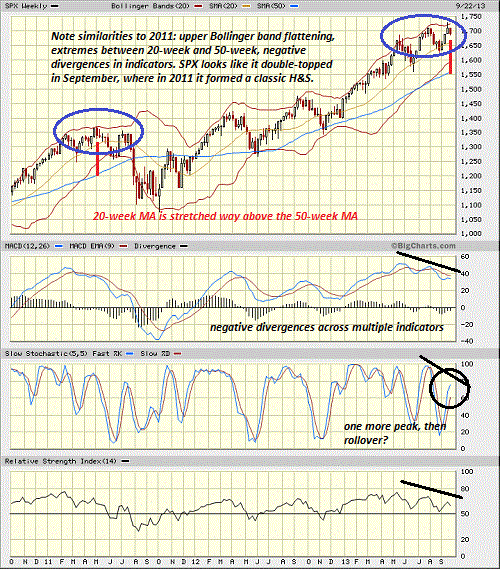[youtube://http://www.youtube.com/watch?v=fhLRfVfsiPY 450 300] [youtube://http://www.youtube.com/watch?v=5PlVXhnhbgc 450 300]
Comments »Yearly Archives: 2013
Wakey Wakey
“He who passively accepts evil is as much involved in it as he who helps to perpetrate it. He who accepts evil without protesting against it is really cooperating with it” ~ MLK
[youtube://http://www.youtube.com/?v=TAozKx95N9w 450 300] [youtube://http://www.youtube.com/watch?v=B1T8xgHdMEM 450 300] [youtube://http://www.youtube.com/watch?v=UmNV8_VBGX0 450 300]Comments »
A Word From Jesse Ventura on Gang Warfare D.C. Style
[youtube://http://www.youtube.com/watch?v=Atcu5_gZPsk 450 300]
The gang:
[youtube://http://www.youtube.com/watch?v=rCn4hWNcj1A 450 300] Comments »$ADBE Gets Hacked; Millions of Users Compromised
“A security breach targeting the source code used by software giant Adobe has compromised the information of nearly three million customers, the company confirmed this week.
Brad Arkin, Adobe’s chief security officer, announced in a blog post Thursday that a sophisticated cyber attack on the company’s network caused the source code for numerous programs to be illegally accessed by hackers, as well as the personal information of millions of Adobe users.
Founded in 1982, the Silicon Valley company is known for an array of products, including the PhotoShop editing software and the PDF, SWF and FLV file formats.
According to Arkin, Adobe believes the attackers pilfered customer names, encrypted credit and debit card numbers, expiration dates, and other information related to customer orders pertaining to roughly 2.9 million Adobe clients.
Arkin said the company does not believe the attackers accessed decrypted information, but stopped short of confirming that plain-text data wasn’t compromised.
“We’re working diligently internally, as well as with external partners and law enforcement, to address the incident,” he said.
He also stated that the theft of customer data and the source code for numerous Adobe products was likely related.
Brian Krebs, a well respected security researcher and former Washington Post reporter, acknowledged that he stumbled upon a 40 GB trove of Adobe source code around one week ago on the same server thought to be used by the hackers behind other recent major compromises. Krebs said that the source code pertained to Adobe’s ColdFusion and Acrobat software, which would suggest that hackers have obtained the blueprints for some of the company’s most widely used products.
Hold Security, a firm that worked in conjunction with Krebs, said that “This breach poses a serious concern to countless businesses and individuals.”
If hackers have been able to access Adobe source code, they could theoretically be able to analyze that information and engineer malware that exploits vulnerabilities and compromises the security of several million users, experts fear.
“Effectively, this breach may have opened a gateway for new generation of viruses, malware, and exploits,” Hold Security said in a statement….”
Comments »Documentary: The Art of Deception
The Art of Deception
[youtube://http://www.youtube.com/watch?v=NAmGnyj0u7E 450 300]Black 911 Money
[youtube://http://www.youtube.com/watch?v=yJDFHd5eEzw 450 300] [youtube://http://www.youtube.com/watch?v=DVL4IAKA9Lc 450 300] Comments »NSA Whistle-Blower Testifies Before the EU Parliament
[youtube://http://www.youtube.com/watch?v=02ljBDNr100 450 300]
Comments »Bow Tie: “Be Careful… You’re In A Fool’s Paradise”
“Jim Rogers has a two-word message for U.S. investors: “Be careful.”
“The U.S. is the largest debtor nation in the history of the world,” Rogers told CNBC.com Wednesday night by phone from Singapore. “We may well have a big, big rally in the U.S. stock market, but it’s not based on reality. I would encourage investors to know you’re in a fool’s paradise, be careful, and when people start singing praises, say, ‘I’ve been to this party before, and I know know it’s time to leave.'”
For Rogers, the author of “Street Smarts: Adventures on the Road and in the Markets,” it is only a matter of time until the U.S. stock market runs into devastating problems due to the Fed’s quantitative easing program and the prevalence of similar stimulative programs around the world.
“First of all, throughout American history, we’ve always had slowdowns every four to six years. That means that sometime in the next couple of years—three years, maximum—we are going to have problems again, caused by whatever reason,” Rogers said. “For instance, there was 2001 and 2002, and then 2007 and 2009 was much worse. Well, the next time it’s going to be worse still, because the level of debt is so, so, so much higher. Every country is increasing its debt at the same time.”
Stimulative measures by central banks, such as the purchasing of assets with created money, boost asset prices in the short term. But Rogers said that central banks can only do so much….”
Comments »Twitter Files for IPO; Looking to Raise a Billion
“Twitter has just filed for its long-anticipated IPO. The company is looking to raise $1 billion in this initial offering, which is set to mint many millionaires among shareholders and founders like Ev Williams, Jack Dorsey and Biz Stone. Currently, the filing does not list a valuation, and sources are saying that’s because they have yet to determine one.
Twitter’s revenues have been revealed for the first time, as well. Revenues for 2012 were $316.9 million, for a loss of $79.4 million and in the first half of 2013 they’ve already earned $253.6 million for a loss of $69.3 million. That’s just above estimates from last year but well below tracking of over $600 million for the year. Overall, Twitter has lost $418.6 million since it began.
Twitter will be offering up 472,613,753 shares of stock in this initial release. Twitter says that it currently has 218.3 million monthly active users, and those users have created over 300 billion tweets. That MAU number is significantly lower than many had expected at this point as they announced that they had 200 million MAUs in December. Twitter says that it delivers over 200 billion tweets per day.
Twitter says that 75 percent of its MAUs access the service from mobile devices (that’s 161.25 million) and that 65 percent of all of its ad revenues come from mobile. This marks a big contrast to Facebook, which had no revenues in mobile at all when it filed for IPO.
Twitter says that in the second quarter of 2013 there were approximately 30 billion ‘online impressions’ of tweets…”
Comments »
CME Hikes S&P 500, Dow Jones, Nasdaq E-Mini Margins By 9%
“Remember when the CME and the administration punished speculative gold longs in 2011, and crude longs in 2012 by hiking or warning to hike margins beyond the breaking point for levered holders of futures contracts? It works for stocks as well. Last night, the CME may have taken Obama’s warning to the market a little too seriously, and announced a hike in the core E-Mini futures contracts of about 9% ….”
Comments »Free Energy for the People?
[youtube://http://www.youtube.com/watch?v=u82N-Lyg1cE 450 300]
Comments »“The Status Quo is Saved” Rally in the Stock Market
“We can anticipate another rally once the political charade plays out, but what happens after that?
We can safely predict the inevitable budget-debt ceiling deal will spark yet another “the Status Quo is saved” rally in the stock market. But what happens after that?
Here is a three-year chart of the S&P 500 (SPX). The potential for another spike higher is reflected in the rising stochastics.
But overall, the chart is showing weakness and the potential for a serious decline. The negatives include:
1. A number of indicators (MACD and relative strength) are negatively divergent, i.e. they are declining as price moves higher
2. The 20-week moving average (MA) is stretched above the 50-week MA (i.e. the market has reached a point where the 20-week tends to converge with the 50-week MA)
3. The upper Bollinger band is flattening, showing loss of momentum.

Some similarities with 2011 are discernible. In 2011, a multi-month topping process traced out a classic head-and-shoulders pattern…..”
Comments »Exceptional Retrograde
[youtube://http://www.youtube.com/watch?v=NokZdFXy6RU&feature 450 300]
Comments »A Word From the Bow Tie on the Government Shutdown
[youtube://http://www.youtube.com/watch?v=6K-M4qg6Mzw 450 300]
Comments »Globalization: Fleshing Out the End of an Age
“In his latest note to clients, Morgan Stanley head of global economics Joachim Fels relays an idea he says has him increasingly worried these days, even though, in his words, it is “no more than a tentative thesis that still needs to be fleshed out and checked for robustness.”
“In short, I wonder whether just as 1913 marked the end of first Golden Age of globalisation that had begun in 1870, 2013 may mark the end of our age of globalisation, which accelerated since the 1980s and 1990s after many emerging markets opened up to international trade and capital flows,” says Fels. “To be sure, I’m not predicting the world wars, mass sufferings and economic depressions of the three dark decades following 1913, but I do worry about a creeping trend towards a de-globalisation of economic activity and capital flows.”
Fels points to the Federal Reserve’s easy-money policies following the financial crisis, which caused investors to scramble into investments in emerging markets, a trend that is now reversing.
The economist envisions problems down the road as a result, as he explains in his note….”
Comments »How to Profit From the Greatest Wealth Transfer in the History of Mankind
Part two talks about the seven stages of an empire along with the process of the debasement of currency. If your interested you may watch here: Part 2
Otherwise the value can be found in part 3:
[youtube://http://www.youtube.com/watch?v=y-IemeM-Ado 450 300] Comments »What to Expect From a Government Shutdown
“Morgan Stanley’s chief U.S. economist Vincent Reinhart published a brief note minutes after the U.S. government shutdown went into effect.
“Dysfunction is not new, in that this marks the seventeenth shutdown in the past forty years,” wrote Reinhart. “About 800,000 government workers will stay home, as federal employees who cannot be paid should not work.”
Here’s the key takeaway from the note:
In addition to finger pointing to assign blame, expect:
- A 15 basis point drag on fourth-quarter real GDP growth, at an annual rate, for every week of shutdown as those furloughed workers do not put in their usual hours;
- Most data releases to be delayed…”
The Greatest Wealth Transfer in the History of Man
[youtube://http://www.youtube.com/watch?v=DyV0OfU3-FU 450 300]
Comments »On the Verge of a Government Shutdown: Prepare to Rejoice
“Barring some last-minute miracle, it looks like the government is going to shut down at midnight tonight.
The crux of the matter is that the House GOP is not inclined to pass a budget that doesn’t include some kind of delay or defunding to Obamacare. And obviously Democrats won’t agree to that. So, impasse.
Markets are already falling, it would seem, on the news.
But there are reasons to think this would be good.
Goldman explained why this could be helpful in a note to clients last Friday:
It would be a mistake to interpret a shutdown as implying a greater risk of a debt limit crisis, in our view. It would not be surprising to see a more negative market reaction to a shutdown than would be warranted by the modest macroeconomic effect it would have. We suspect that many market participants would interpret a shutdown as implying a greater risk of problems in raising the debt limit. This is not unreasonable, but we would see it differently. If a shutdown is avoided, it is likely to be because congressional Republicans have opted to wait and push for policy concessions on the debt limit instead. By contrast, if a shutdown occurs, we would be surprised if congressional Republicans would want to risk another difficult situation only a couple of weeks later. The upshot is that while a shutdown would be unnecessarily disruptive, it might actually ease passage of a debt limit increase.
This seems kind of vague, but there are three distinct reasons it could be a positive.
- The market is reacting now….”
Heart Based Wisdom
[youtube://http://www.youtube.com/watch?v=aKsfuHt1EXg 450 300]
Comments »Documentary: Four Horseman
[youtube://http://www.youtube.com/watch?v=5fbvquHSPJU 450 300] [youtube://http://www.youtube.com/watch?v=9QtZsJg2ZxE 450 300]
Comments »

